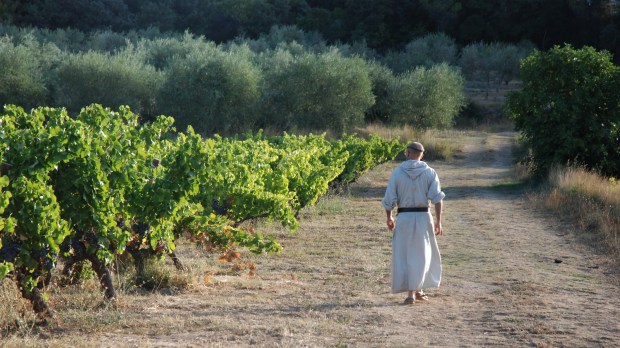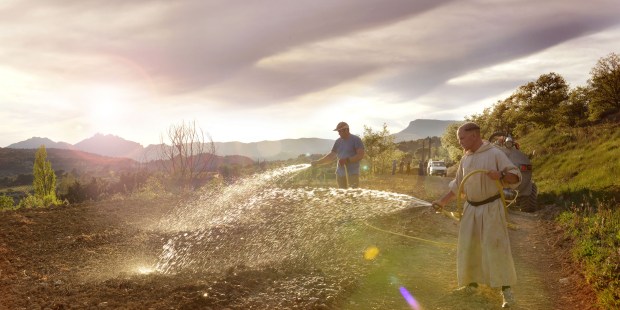They are about 30 men, lined up face to face in two rows, on either side of a path that crosses a plot of vines. They are young, vigorous and full of strength, and yet their smile is as disarming as that of children. Some of them wear a tonsure, the ancestral sign of their renunciation of the world. They are dressed in their traditional monastic habit. They are Benedictine monks from the abbey of Saint Madeleine du Barroux, whose church tower can be seen from a distance, on the heights overlooking the vineyards. At their feet are empty crates that will be filled in a moment with the first grapes of the harvest, sun-drenched clairettes.
“Looking to heaven, the monks have designed the gardens of the earth.”
For the time being, the monks are meditating, singing the praise of God, before picking under the Provencal sun the new fruits of the vine, which the good weather has brought to maturity. “Ora et labora” (“Pray and work”) is their motto: They work in silence with precise gestures and a regular, unfaltering rhythm. They look up from time to time to thank God for such abundance. The hard work of the vineyard assures their subsistence; it also allows them to earn a path to heaven.
As I contemplate this scene, I recall a phrase from Dom Gérard, the founder of the abbey: “Looking to heaven, the monks have designed the gardens of the earth.” Here everything is in its place, in the tranquility of an order that brings joy and peace: rows of vines framed dry stone walls rub shoulders with fields of olive trees and scrubland where junipers, rosemary, holm oaks, honeysuckle and thyme cohabit.
The Romanesque abbey fits into the landscape as one of its natural elements. The rocky aesthetics of the elegant Dentelles de Montmirail and the majestic Mount Ventoux complete the picture to give it a timeless accent. A scent of eternity rises from the earth. We are at the very place where Clement V, the first Pope of Avignon, planted the first pontifical vineyard at the beginning of the 14th century. Some 700 years later, nothing seems to have changed, as if this place was preserved from the fury of the world.
The monks have revived an age-old tradition that associated the men of God with their peasant environment through performing the same labor. By proposing to the neighboring winegrowers that they join them in making great wines and thus ensuring them a decent income, they restored the soul of these monastic estates, which created around them an immense human poetry against which nothing could prevail.
They opened a way of charity, “Via Caritatis,” which gives its character to the wines they produce. The phrase, which the medieval historian Georges Duby applied to Cistercian art, is perfectly suited to define its nature: “It reaches what is most complex by what is simplest, the irrational by reason and sweetness by power.”
Vox rouge is a charming wine, full, powerful, round and fleshy. It is a quintessence of red fruits, an explosion of freshness and purity; Pax rouge is ample and generous. It combines elegance, character and finesse, with unctuous tannins melted in a bouquet of spices, mentholated fragrances and caramel; Lux red is a voluptuous wine that expresses both the suavity of the monastery and the majesty of the landscape in which it grew. Lux rosé is a masterpiece with its subtlety and bewitching aromas of rose petals; Lux white, marked by white flowers and almonds, combines density with finesse.
These micro-vintages born from a 700-year-old treasure are available for the first time in the United States on the website www.viacaritatis.us . From their celestial balcony, the winegrowing monks of all times rejoice with us.
Marc Painier is author of “La mémoire du vin, entre héritage et transmission” (“The Memory of Wine, Between Heritage and Transmission”), published by Mareuil éditions. He’s currently working on a book on wine and monks.


